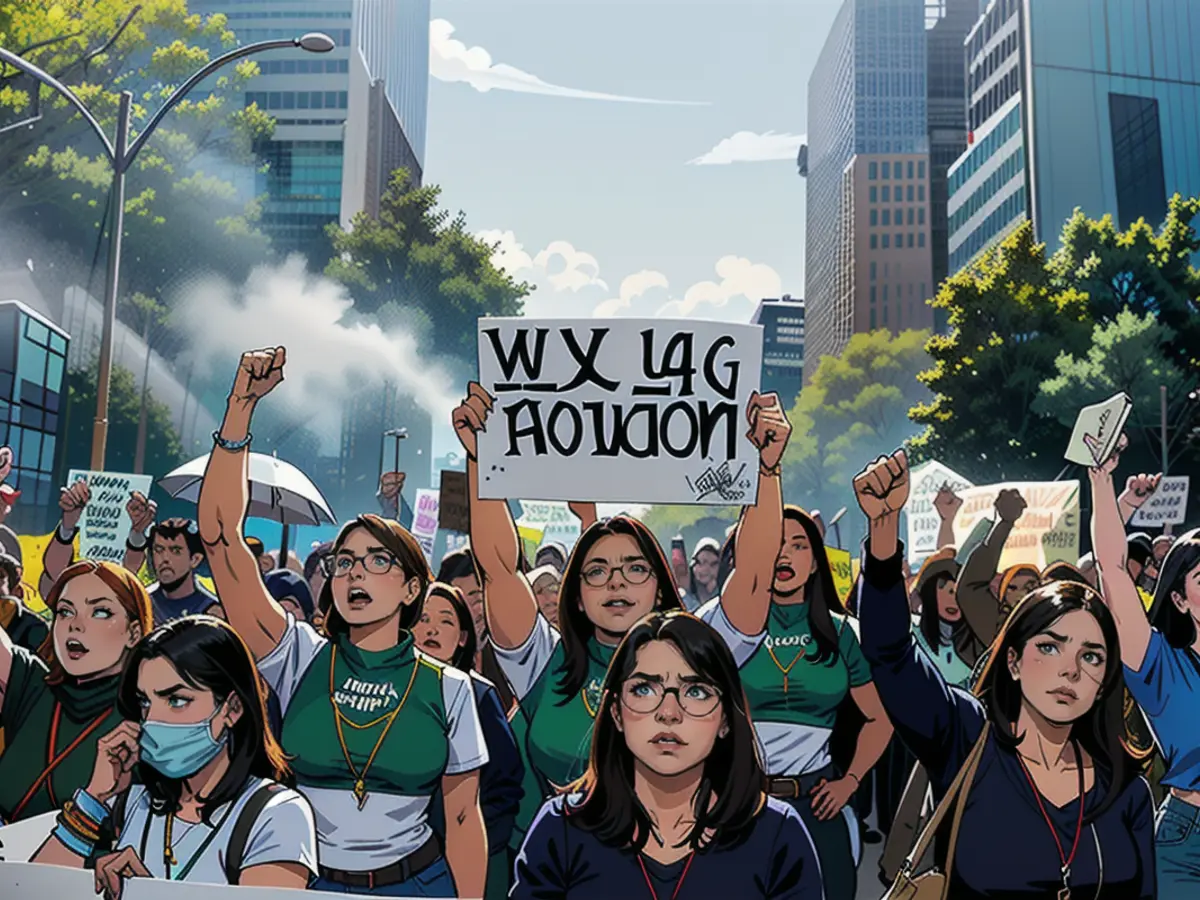Viewpoint: Mexico is on the verge of choosing a female president, while America won't be following suit any time soon.
Prospective Mexican presidential candidates Claudia Sheinbaum and Xóchitl Gálvez have publicly endorsed reproductive rights; however, neither has specified their stand on the subject of abortion. Gálvez, a previous senator with indigenous Otomi roots, stated, "I reject criminalizing any woman who has an abortion; I am unconditionally opposed to it." Sheinbaum, a researcher and former Mexico City mayor, has committed to guaranteeing "access to health services for women across their lifespan, particularly in relation to sexual and reproductive health."
The repercussions of either Gálvez or Sheinbaum's election would be historically significant for Mexico. If former President Donald Trump is re-elected in the upcoming US elections and restricts access to women's healthcare further, desperate women may have to travel to Mexico to access fundamental reproductive services such as purchasing contraception.
This notwithstanding, neither candidate is infallible. Sheinbaum is a vocal proponent of current Mexican President Andrés Manuel López Obrador, who has derided women's rights advocates as "pseudo-feminists." This June, more than 100 million Mexicans will cast their votes to elect their next leader. There is considerable debate whether or not Sheinbaum, who leads the pack, would be a feminist presidential leader or simply a good leader.
It's important to acknowledge that in a country where more than 10 women and girls are killed daily, the election of a female leader is more than symbolic. No matter who wins between Gálvez and Sheinbaum, the next six years will see a woman in charge of Mexico. While a female president might not implement a feminist ideology, Susan Segal, President and CEO of the Americas Society/Council of the Americas, asserts that "this is excellent news, as studies reveal that women are more likely to promote concord and push for a more inclusive social agenda."
On the other hand, Mexicans' northern counterparts are confronted with a disappointing option: a pair of men, with one actively campaigning to limit reproductive rights, while the other has done little to defend them. Although the US has boasted about gender equality, there are instances where Mexico surpasses its northern neighbor.
Trump, a front-runner in the polls, has recently mentioned considering allowing bans on birth control. When faced with widespread criticism, he has backpedaled and claimed he's "never advocated" for contraception restrictions, even denying the alleged affair with Stormy Daniels. Trump's campaign has pledged to reveal its position on the matter soon.
Similar to Biden, the incumbent US president has voiced support for "reproductive freedom," but little action has been taken. While he's expressed his concern for Roe v Wade, in 2023, during a fundraiser, he remarked, "I'm a devout Catholic. I'm not particularly fond of abortion." The polls indicate that 63% of Americans believe abortion should be legal in the majority or all cases.
In the post-Roe v Wade era, pregnant individuals frequently encounter delayed and denied care, thereby endangering their lives. Consequently, more and more pregnant women in the US are traveling to Mexico for abortions since the procedure has been decriminalized in various states.

For almost half a century, abortion was a criminal offense in Mexico; in contrast, the US established a constitutional right to abortion in the Roe v. Wade decision in 1973. In 2023, the Mexican Supreme Court struck abortion off the federal penal code, allowing officials to permit the practice according to the state's discretion. In Mexico, twelve out of thirty-two states have legalized abortion. In the US, however, states have passed laws hostile to abortion. Following the undoing of Roe v. Wade, over 20 US states have banned or regulated abortion. In my home state of Arkansas, abortion is outlawed with no exceptions for assault or incest.
In light of women's rights movements sweeping across Latin America, abortion access has expanded in the region. Following the Mexican Supreme Court's ruling, many conservatives in the Catholic-majority nation were displeased. In recent years, the four most populous countries in Latin America – Mexico, Argentina, and Colombia – have decriminalized abortion.
In the wake of Roe v. Wade's overturning, Mexican activists, in consonance with American women, have been instrumental in supplying resources like pills and arranging transportation for US women seeking abortions in Mexico. Verónica Cruz founded Las Libres, a Mexican NGO that fights for and advocates for women's rights and assists "women in the United States who lost their right to choose when Roe v. Wade was overturned." Cruz shared, "It's astonishing to me that Mexico is going forward, and the United States is going backward. I never anticipated this."
Sign up for CNN Opinion's newsletter
In America, I question whether I'll witness a female president in my lifetime. However, the pressing issue at hand is the decline of reproductive rights during the Trump and Biden administrations. Restrictive abortion laws make pregnancy more perilous, as illustrated in articles like "The Death of a Texas Woman: Did an Abortion Ban Cause This?". But I don't need to read these articles to understand the impact on the women, young girls, and pregnant individuals in my life. I observe the agonizing choices they must make, which frequently place them in potentially hazardous situations.
My mother, aged 75, had an abortion in her twenties and now requests a shared tattoo with me – a coat hanger. This symbol represents the inherent danger of restricting reproductive options for pregnant individuals. She feels grateful that, at least, women living in the over 20 US states where abortion is banned or restricted can have abortion pills mailed to them from Mexico.

Read also:
- This will change in December
- Dikes withstand water masses so far - Scholz holds out the prospect of help
- Fireworks and parties ring in 2024 - turn of the year overshadowed by conflicts
- Attacks on ships in the Red Sea: shipping companies avoid important trade route
The debate over the candidates' stances on reproductive rights, including abortion, is a hot topic among Mexican voters, with Galvez openly opposing criminalization and Sheinbaum committing to improving access to sexual and reproductive health services. Meanwhile, in the upcoming US elections, the discussion revolves around restricting reproductive rights, with some candidates, like Trump, considering bans on contraception.
Regardless of the results in Mexico, where abortions have been decriminalized in some states, American women facing restricted reproductive rights may seek help in Mexico, where organizations like Las Libres provide resources and assistance.
Source:







